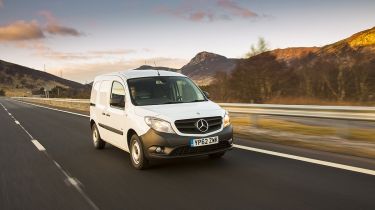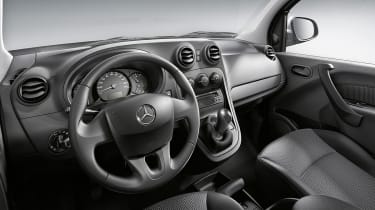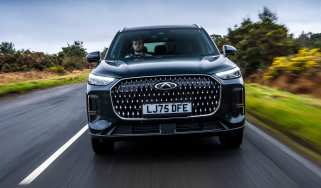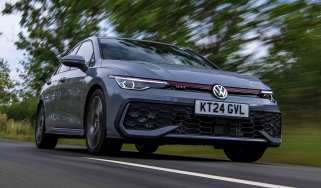Mercedes Citan (2012-2021) van review
The Mercedes Citan van comes in three sizes, plus five seater Crew Van and Tourer versions
The Mercedes Citan is the German firm's first small van, but it's remarkably similar to a product from a more humble brand. That's because if you remove the three-pointed star and big grille, the Citan's design, technology and engines are all taken from the rather more humble Renault Kangoo.
The two vans are built alongside each other at Renault's factory in Northern France, too, but Mercedes has tweaked some of the suspension settings to its own specification.
So why pay the extra for the Citan? Simple - badge appeal sells. Mercedes' larger commercial vehicles, the Sprinter and Vito, have become very popular among companies that want to convey a more upmarket image than those who tool around in Transits. And the Citan is designed to do the same thing.
The Citan has quite a bit of competition, but none of it shares the premium appeal of the Mercedes badge. As well as its in-house Kangoo rival, there's the Peugeot Partner and Citroen Berlingo. Slightly further upmarket sits the Volkswagen Caddy, while the Fiat Doblo and Ford Transit Connect also appeal. Finally, sitting on a similar wheelbase but with a totally different shape, the Nissan NV200. Phew.
Used - available now

2023 Citroen
C3 Aircross
15,028 milesManualPetrol1.2L
Cash £11,650
2021 Ford
Fiesta
24,012 milesManualPetrol1.0L
Cash £9,580
2023 Ford
Fiesta
22,118 milesManualPetrol1.0L
Cash £14,831
2024 Skoda
Octavia
8,643 milesManualPetrol1.5L
Cash £18,045The Citan is available in three lengths; compact, long and extra long. A combi version, officially known as the Citan Crew Van provides up to five seats and a flexible load space, using a 60:40 split-folding rear seat. There's also a fully glazed five-seat MPV-type version called the Citan Tourer. In contrast, Renault no longer sells a passenger version of the Kangoo.
The Compact model is comparable in size to the Citroen Nemo, Fiat Fiorino and Peugeot Bipper. There's no Renault Kangoo Compact, the model was withdrawn from the UK in late 2011. Mercedes says it has re-engineered several aspects of the Kangoo for its own needs, including the wiring, and it feels more refined than the Kangoo. The Citan is powered by Renault’s long-running 1.5 dCi diesel engine from the Kangoo, with power outputs of 75bhp, 90bhp and 110bhp. There's also a 114bhp 1.2-litre petrol engine.
MPG, CO2 and Running Costs
Renault’s 1.5 dCi diesel has been powering car and van models for some time and has established a reputation for offering good fuel economy, even if it's not up to the fuel-efficiency standards of newer diesel engines.
In the Citan, Mercedes quotes a range of combined consumption figures between 60.1mpg and 65.7mpg, with CO2 emissions of 112g/km to 126g/km, which are among the lowest in its class.
The best figures suggest marginally better fuel consumption than the Citroen Nemo, Fiat Fiorino and Peugeot Bipper, while for the BlueEFFICIENCY long model, the figures are competitive with models such as the Citroen Berlingo Airdream EGS6 and Peugeot Partner EGC, but better than the Fiat Doblo Cargo, Nissan NV200 (powered by the same diesel engine), or VW Caddy.
Service intervals are ahead of most rivals, coming up every 24,000 miles, while insurance groups may be helped by the standard ESC with a range of 5e to 9e.
All versions feature a vehicle immobiliser, but you'll need to pay extra for the alarm system as it's optional. Standard equipment for panel vans includes a full-height steel bulkhead to separate the load area and cab, or a folding bulkhead is an option when the folding passenger seat is fitted, giving the driver protection from the load on two sides when the seat is folded.
Load Space and Practicality
The range of Citan models give the van wide appeal. The smallest Compact is comparable in size to the Citroen Nemo, Fiat Fiorino and Peugeot Bipper. The Citan offers 2.4 cubic metres to the 2.5 cubic metres of the Nemo, Fiorino and Bipper, and like these models, the Citan offers a folding passenger seat to extend the load floor length on the passenger side.
Even so, the Citan has a shorter load area, measuring 1,369mm long compared to the Nemo/Fiorino/Bipper’s 1,523mm. The Citan claws this back where width is concerned, because wheelarch intrusion is minimal in all Citan models, giving 1,219mm between the arches, meaning a Europallet could just be accommodated width ways.
Even though the Citroen Nemo, Fiat Fiorino and Peugeot Bipper offer a little more load area width, at 1,473mm compared with the Citan’s 1,460mm, the wheel arches take up more space in the Compact than in the larger models and the width between them has a greater effect on load area width than in the longer vans.
The larger Citan 1,753mm-long load compartment is shorter than in the VW Caddy, Fiat Doblo Cargo, Vauxhall Combo, Citroen Berlingo and Peugeot Partner, while the extra long’s 2,137mm load length is longer than in the Nissan NV200, Citroen Berlingo, Peugeot Partner, Fiat Doblo Cargo L2 and Vauxhall Combo L2. The Citan Compact offers 490kg of gross payload, down on the 610/660kg of the Nemo. Fiorino and Bipper, while the Citan long and extra long, with a 735kg to 810kg gross payload range, can't match the 1,000kg of the Fiat Doblo Cargo and Vauxhall Combo.
The Ford Transit Connect, Citroen Berlingo and Peugeot Partner also offer higher payloads. Asymmetric rear doors are standard on the Citan, with the option of a top-hinged tailgate. Four, six or eight load lashing rings in the floor are standard, depending on the model, and there's an option for more lashing rings or rails fitted to the sidewalls, with moveable rings. Load options include a roof flap at the rear and a variety of roof racks, plus towing equipment.
Reliability and Safety
The Citan is based on the long-running Kangoo, which seems to have a reasonable reliability reputation and the 1.5-litre diesel engine appears to give good service.
The whole Citan range is fitted with electronic stability control (ESC) as standard, giving the van an electronic safety net. ESC will brake individual wheels to help keep the driver in control in slippery conditions and the system in the Citan will compensate for a load, intervening earlier with a heavy load aboard than when lightly laden.
Like most rivals, a driver’s airbag is standard, while a passenger airbag and side airbags are on the options list.
Driving and Performance
Despite its relatively small size, the diesel engines perform well, with the 90bhp 109 CDI engine better suited to short-distance work whle offering a good performance and economy compromise. Both the 112 petrol and 111 CDI diesel are equipped with a six-speed manual gearbox as standard, while the 109 CDI comes with a five-speed manual gearbox. If youy want an auto, your only option is to go for the 112 petrol, which gets a Renault-sourced six-speed self-shifter.
The 112 is equipped with Mercedes BlueEFFICIENCY package as standard, which includes engine stop-start and alternator management to charge the battery when the engine is not under load. BlueEFFICIENCY is an option with all diesel engines.
Cab and Interior
The interior is based on the Kangoo, but the dashboard is different, even if the basic layout with dash-mounted gear change is similar. Mercedes has even redesigned the column stalk layout to include its trademark single stalk operating everything from indicators to wipers - a needless complication, to be honest.
On the plus side, the Citan is more refined than the Kangoo on which it is based, suggesting that Mercedes has spent some time in dealing with noise insulation. The van also feels more taut, with less of the soft-wallowing suspension than with the Kangoo. Mercedes has done a good job with the available material.
Van dimensions
| Body style | Height | Width | Length |
| Compact | 1,810mm | 1,829mm | 3,937mm |
| Long | 1,816mm | 1,829mm | 4,321mm |
| Extra Long | 1,839mm | 1,829mm | 4,705mm |
| Dualiner | 1,823mm | 1,829mm | 4,705mm |
Load area dimensions
| Body style | Height | Width | Length | Volume |
| Compact | 1,258mm | 1,460mm | 1,369mm | 2.4m3 |
| Long | 1,258mm | 1,460mm | 1,753mm | 3.1m3 |
| Extra Long | 1,258mm | 1,460mm | 2,137mm | 3.8m3 |
| Dualiner | 1,255mm | 1,460mm | 1,337mm | 2.4/3.7m3 |
(Width between wheel arches 1,219mm)




